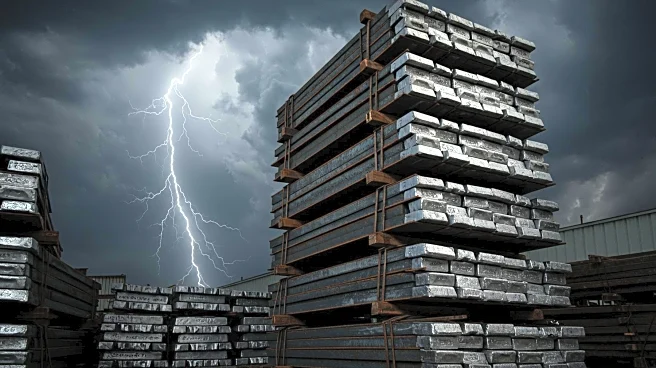What's Happening?
President Trump has implemented a 50% tariff on hundreds of goods considered 'derivative' steel and aluminum products, such as butter knives, baby strollers, spray deodorants, and fire extinguishers. These items were previously excluded from the tariff but were subject to higher country-specific tariffs. The U.S. Customs and Border Protection and the Commerce Department announced that 407 categories of goods containing steel and aluminum would be subject to the new tariffs. This decision affects U.S.-based importers who now face higher costs for goods already in transit. Importers must decide whether to accept the goods and pay the increased tariffs or refuse them, potentially incurring financial losses. The move aims to support the revitalization of the American steel and aluminum industries by closing loopholes for tariff circumvention.
Why It's Important?
The expansion of tariffs is significant as it increases import costs for U.S. businesses, potentially leading to higher consumer prices. The tariffs are expected to ripple through the manufacturing supply chain, raising production costs in sectors such as construction, automotive, and electronics. While businesses may not pass the entire tariff expense to consumers, the high rate of 50% makes it challenging for companies to absorb the costs without affecting prices. This policy could benefit domestic steel and aluminum industries by reducing competition from imported goods, but it may also strain international trade relations and impact global supply chains.
What's Next?
U.S. importers will need to navigate the financial implications of the new tariffs, potentially adjusting their supply chains or seeking alternative sources for affected goods. The increased tariffs may prompt discussions among industry stakeholders and policymakers regarding trade policies and their impact on the economy. Businesses may explore strategies to mitigate the effects of higher tariffs, such as negotiating with suppliers or adjusting pricing models. The broader economic impact will depend on how industries adapt to the increased costs and whether further tariff adjustments are made.
Beyond the Headlines
The tariff expansion raises questions about the long-term effects on international trade relations and the potential for retaliatory measures from affected countries. It also highlights the ongoing debate over protectionist policies and their impact on global economic dynamics. The decision may influence future trade negotiations and agreements, as countries assess the implications of U.S. tariff policies on their economies.









